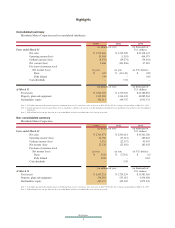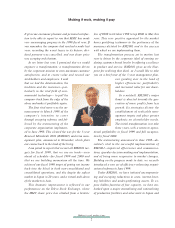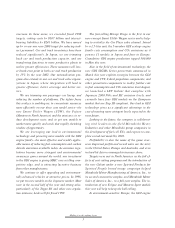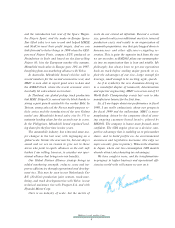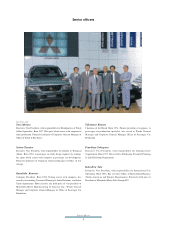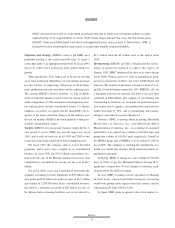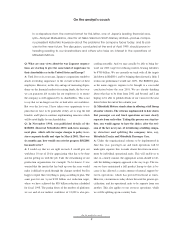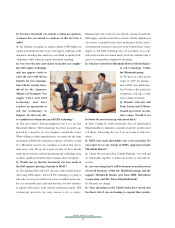Mitsubishi 1999 Annual Report Download - page 13
Download and view the complete annual report
Please find page 13 of the 1999 Mitsubishi annual report below. You can navigate through the pages in the report by either clicking on the pages listed below, or by using the keyword search tool below to find specific information within the annual report.
On the analyst's couch
11
and financial base so that we can make a profit on sales of
80,000 in Japan and 70,000 overseas.
Q: Tie–ups in the motor industry, until recentry, have usu-
ally been limited in scope, but all of a sudden, in the space
of six months, we have seen a major change in this.
A: From a business angle, the pursuit of scale is certainly
meaningful up to a certain extent. Ours, in particular, is an in-
dustry of scale, so I do not reject the pursuit of scale per se. In
terms of manufacturing cost, however, the benefits of scale
disappear at a fairly low volume. But it is a
different story when we look at develop-
ment cost. A five-fold difference in volume
means a five-fold difference in recovering
that cost. That's why auto makers try to do
as much OEM as possible.
Q: It looks pretty certain that the burden
of development costs will increase in fu-
ture.
A: As development costs escalate, particu-
larly in the fields of safety and environmen-
tal technology, companies will find it increasingly difficult to
shoulder them on their own. This would be a good reason for a
company to consider a merger or acquisition, I suppose, but I
see no sense in the M&A approach solely for the pursuit of
scale. Companies must be able to share development costs.
Today, we are at technological cross-roads and there will be
auto makers who are unable to develop particular technolo-
gies. Again, this would present a good opportunity for entering
an alliance, but I do not go along with the argument that M&A
is the sine qua non for survival or success.
Q: You are reported as saying that you are willing to con-
sider any collaborative association so long as it presents a
win-win solution.
A: My view is that tie-ups, of any form, should be on a solid
business basis, regardless of who the other party is. Should the
parties wish to expand a particular area of business, and it's
something that requires a major investment of money, then
surely it is simply normal business practice for them both to
put money into it. In the area of trucks, we already have em-
barked upon an operational alliance with Volvo and if things
go well we would certainly look at expanding it further.
Q: If you manage to go on reducing your interest-bearing
liabilities at the current rate, perhaps you won't need to
think in terms of M&A?
A: I don't think we will. Were we suddenly required to pay off
our ¥2 trillion borrowings by tomorrow, then we would have
to turn somewhere for help. But we are not in that situation
and so we have no intention of seeking help.
Q: Moody's currently rates Mitsubishi
Motors' debt Baa3. Do you foresee any
further downgrading?
A: I believe we will see a change in our rat-
ing when we publish our business results for
fiscal 1998. I don't know how Moody's ar-
rive at their rating, but since the results will
show there has been no upset or deteriora-
tion in our plans and forecasts, that
RM2001 is right on track, I can think of no
reason for a further downgrading. While the other Japanese
manufacturers have all reported a deterioration in results and a
falling short of targets, Mitsubishi Motors' RM2001 manage-
ment plan is right on track–to the extent that we are thinking
of bringing our targets forward. A good look at just how much
progress we have made, will show that our shares actually of-
fer a good investment opportunity. I believe that investors will
focus upon how we are shaping up for 1999 and beyond.
Q: Is there any way that Mitsubishi Motors can make a lot
of money overnight?
A: The automobile business is all about percentages. If you
get it right, the pluckings can be huge. If you stick to the ba-
sics and offer a good product at the right price, then the money
is there to be made. We have put some fast-selling products on
the market since I became president and we must keep the mo-
mentum going. To date, we've been putting runners on second
base a lot, but we want some homers too. We have to get to
the plate more frequently, and start piling up the hits.


